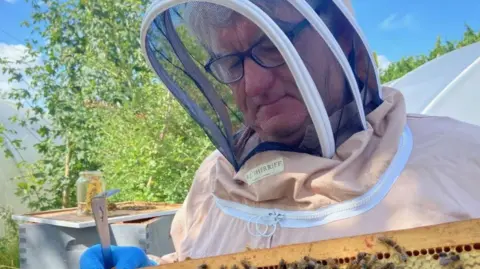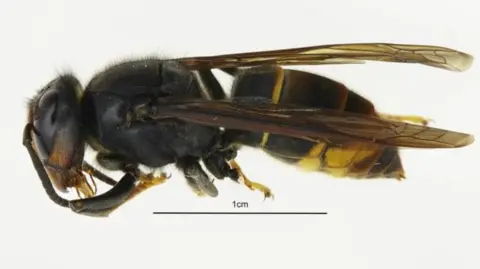Asian hornets pose 'massive risk', beekeeper warns
 BBC
BBCA beekeeper is urging people to report sightings of Asian hornets.
Simon Croson, from Fulbeck in Lincolnshire, said the invasive species posed a "massive risk to nature".
Asian hornets can damage bee colonies and harm other pollinators and the government has warned people to be vigilant.
The "exotic visitor" had "no natural predators in this country", Mr Croson added.
Last year, a "record number" were found in the UK, according to the Animal and Plant Health Agency, which destroyed 72 nests in 56 locations.
While the majority were in Kent, Yorkshire Wildlife Trust said nests were identified and destroyed in East Yorkshire.
Mr Croson said: "If left undeterred, maybe in five years time, with the natural progression from the southern counties, they're going to be a common site and a big threat to all walks of our natural life."
 DEFRA
DEFRAColin Butter, an associate professor in bioveterinary science at the University of Lincoln, said Asian hornets found native bees "pretty easy prey".
"This pest is coming and we will have more of them," he added. "It won't destroy beekeeping, but it will make life more difficult."
While the problem was mostly affecting the south coast, two nests were reported to have been destroyed in Hull last year, which "probably means it's spread a little wider than we're aware of", Prof Butter said.
The Department for the Environment, Food and Rural Affairs (Defra) is urging people to report sightings.
Nicola Spence, Defra’s chief plant and bee health officer, said this would "help us take swift and effective action to stamp out the threat".
While Defra said the Asian hornet posed no greater risk to human health than other wasps or hornets, people have been warned not to disturb or provoke an active nest.
Reports can be logged on a smartphone app called "Asian Hornet Watch".
Follow BBC Lincolnshire on Facebook, X (formerly Twitter), and Instagram. Send your story ideas to eastyorkslincs.news@bbc.co.uk